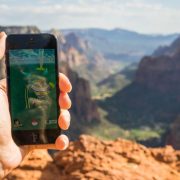The Potential Legal Controversy that “Catches” Pokémon Go
Author: Janine Lin, translated into English by Colbert Hung
Don’t get surprised if you see a group of people gathering around a public building and playing their mobiles or someone stopping in front of the grass and excitingly taking out their phone, they are on their path of becoming “Pokémon Masters”.

Photo Courtesy Tydence Davis CC BY 2.0
Earlier this month, augmented reality (AR) mobile game “Pokémon Go” was released in the U.S., Australia and New Zealand and becomes immensely popular around the world. In the releasing countries, there have already happened several astonishing news regarding the game. For example, players incurred traffic accidents due to the addiction to the game, or someone surprisingly went into military base while catching Pokémon. Even in the places not yet released, there are news that players tried to enjoy the game through virtual private network and caused the paralyse of the game server which even led to the publisher Niantic, Inc. (“Niantic”) has no choice but shut down the game temporarily.
The game originated from Pokémon game and animation series and is based on the map information of Niantic’s prior popular game, Ingress (which is derived from Google Map). Players need to move, catch, raise, and train Pokémons and choose the “Gym” to join battles. (Niantic claimed that only public facilities such as parks or museums will be set as gyms in real world.) Through the combination of the game map and the real world, players need to leave their couches and proceed the gameplay by going out to different places.
Though the game is not yet released in Taiwan, but the popularity of the game has sparked interesting legal discussions. For example, if players get injured while playing the game, can he/she request for compensation from Niantic? If other people were hurt due to the playing of the game, should Niantic be liable for it? What if one private property is “accidentally” set as a “Gym” and leads to the gathering and wondering of lots of players around his house? What legal liability is applied to Niantic in such situation?
If the players incur any accident due to its addiction to the game, he/she shall be thus responsible for his/her own action. Niantic also specified in the Term of Service on the official website that the players should agree to the risk incurred while playing the game. This makes it beyond the doubt that players will be the one who bear the loss. There does exist the potential claim that the service and the game provided by Niantic is lack of security, however, since Niantic does remind players of the surrounding areas and security in the gameplay, unless there is further evidence of lack of security, attempting to make Niantic subject to service and product liability under Consumer Protection Act is of high difficulty.
Besides, what is worth noticing is that there is an arbitration agreement inside the Pokémon Go Term of Service. Unless players notify Niantic within 30 days after accepting the Term of Service, he/she will automatically be bound by the terms and forced to settle disputes with Niantic by arbitration. The only exception is that the litigation is of small amount or concerning intellectual property. And this even means the waiving of the right to a trial by jury and participating as a plaintiff or class member in any class action.
The next question arises is that will Niantic be liable if others (besides players) were injured by the game? Though the Term of Service allows Niantic to dodge reasonable liabilities of loss or damages caused by right infringements or other illegal actions while playing the game, according to the principle of relativity of contract, the agreements only bounds the players and Niantic itself. If any third party was hurt and there is a negligence in development of the game by Niantic, the third party should go beyond the restriction of the agreement and ask for damages and compensations.
Besides, what has already happened in the U.S. is that there are private properties been marked as “Gyms” in the game which leads to the gathering and wondering of lots of people in front of the place. Though there is a reporting mechanism to remove inappropriate place from Niantic, according to media coverage, the efficiency of removing seems to be unsatisfied. If similar situations happen in Taiwan and the gathering has already disturbed the living quality of the residents, there should be legal rights for the residents to go before courts and request Niantic to remove the infringement besides having police to control the situation. Also if there is any loss caused to the residents, they may claim Niantic of civil liabilities due to its negligence in setting game locations (along with the litigation against the player that causes the harm).
There is also privacy infringement concern in the game other than those legal issues. For examples, players need to open the camera and Global Positioning System (“GPS”) to process the game and thus all the location of players are in Niantic’s constant control. The link of game account with Google account also allows Niantic to gain access to players’ information. Currently, the popularity of the Pokémon Go undoubtedly overshadowed those concerns, however, in order to defend our privacy from the advance of technology, opening new Google account to join the game may be a feasible option.
Extensive Readings:




Leave a Reply
Want to join the discussion?Feel free to contribute!